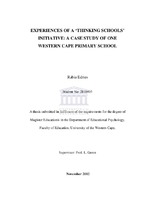Experiences of a ‘thinking schools’ initiative: a case study of one Western Cape primary school
Abstract
In this study I researched the effectiveness of a ‘Thinking Schools’ initiative at a
local primary school between April 2010 and September 2011. I looked at how
the school began the journey, what has changed in the school, the contextual
factors that have influenced the process and what has sustained the school’s
progress. As background to the study I discuss the importance and relevance of
learned intelligence as explained by Vygotsky, thinking skills and cognitive
education, and the whole school approach as opposed to individual teacher
initiatives, as introduced by Burden in the United Kingdom. A local adaptation of
Lipman’s ‘Philosophy for Children’ was the focus of this study, as it was chosen
by the school as the starting point on their road to becoming a Thinking School. A
qualitative research approach was used, using a constructivist paradigm and case
study methodology, following the guidelines established by Stake (1995) and Yin
(2003). The participants included the principal, together with selected teachers
and learners and a curriculum advisor. Data collection took the form of interviews
and a rating scale. The study found positive changes in teacher and learner thinking, supported by the ethos and stability of the school environment. The
major challenge was that not all stakeholders were involved.

